Introduction
Sudanese youth have long strived to resist the ignorance and underdevelopment that have plagued our country for decades. Youth have always been the lifeblood of Sudan. When we look at initiatives aimed at helping Sudanese citizens and providing the basic necessities that are the state's responsibility, such as health, education, and helping and supporting the poor, we find them always at the forefront.
I’ve known Sara Yassin as the close friend of my cousin. From the moment I met her, she was passionate about education and deeply active in helping others. Her efforts were evident in the support and guidance she offers to students and her active participation in the Education Without Borders movement. Sara is a true example of commitment and dedication, devoting her time and energy to empowering others and achieving positive change in the community.
I always saw her posts on Facebook highlighting the ongoing need for volunteers to help students at Al Shaab Al Moalem Center in the Al Jeref Reformatory. These posts reflected the tireless efforts to seek community support. In some posts, I saw her encouraging people to join the Schools rehabilitation project "Hit & Run", a community maintenance project under the Education Without Borders movement, where volunteers work to improve school infrastructure and make it more supportive of student development.
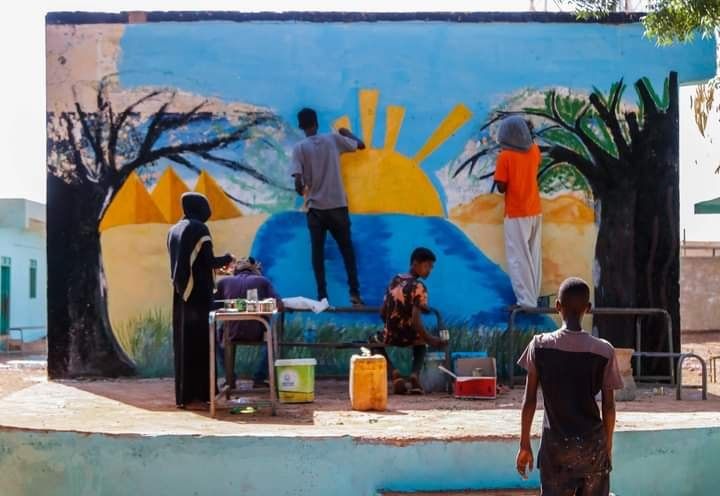
Volunteers in the "Hit and Run" initiative paint a school stage in Khartoum. Source: Education Without Borders (Hit and Run) Facebook page.
I hadn’t heard from her since the outbreak of the war on April 15 2023, but I remembered her when I came across one of her posts on Facebook. She was sitting in one of the "Al Shaab Al Moalem" centers in a Sudanese state that had not been affected by the war, actively continuing her mission and participating in literacy centers there. That’s when I thought of reaching out to her for an interview, to learn more about her journey and shed light on her story and how it all began.
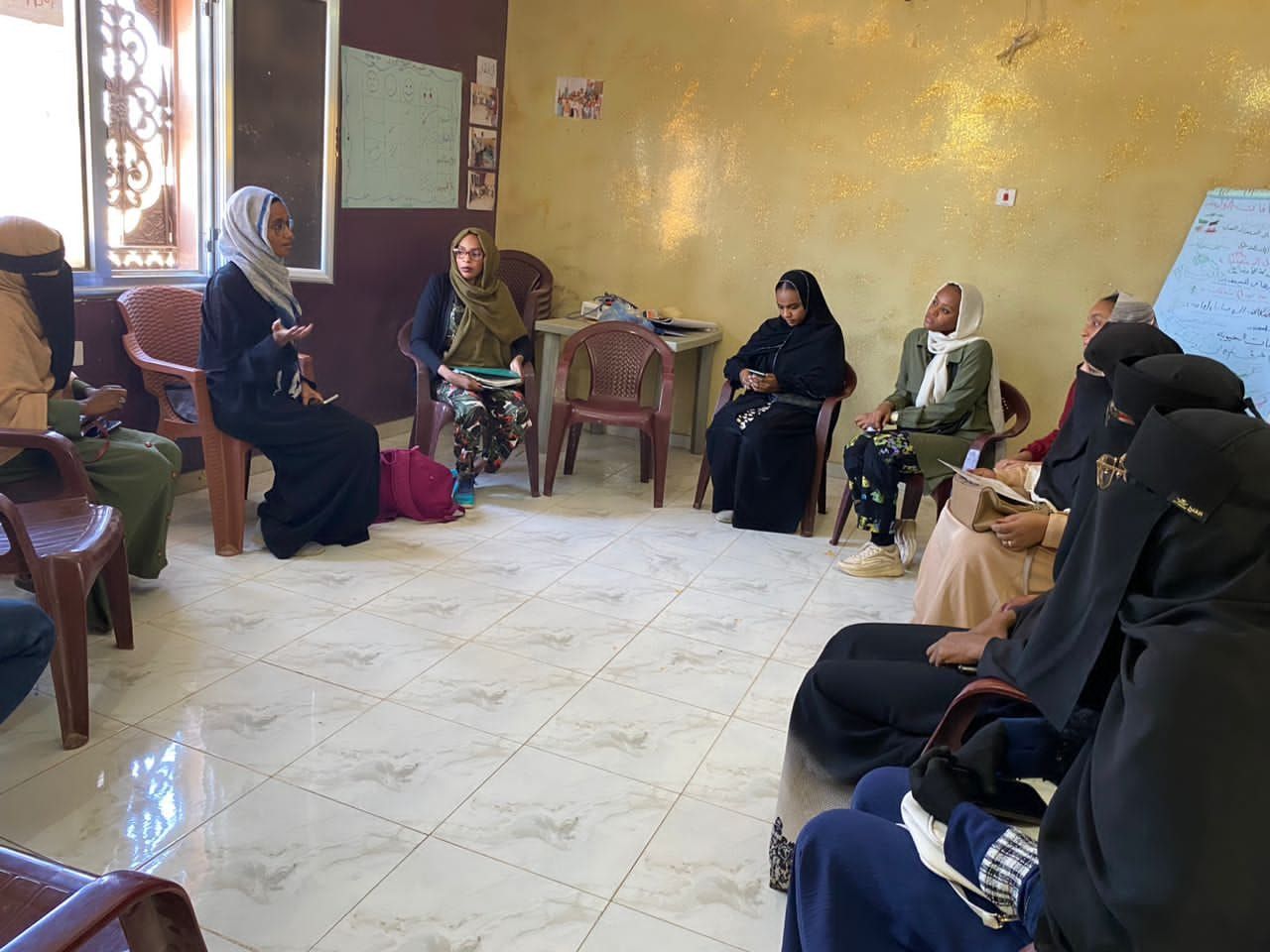
Sarah (green scarf) at a meeting of Al Shaab Al Moalem' Team in Dongola. Source: Al Shaab Al Moalem' Facebook page
Andariya: Tell me about "Education Without Borders" and how it started.
Sara: Taaleem Bila Hudood (Education Without Borders) is not a registered initiative or organization; it’s a social change movement that aims to improve education and the educational environment throughout Sudan. It does this by activating the community and engaging with it through various projects under the movement’s umbrella. The goal is to leave behind a community that believes in the urgency of education as a vital issue, one capable of mobilizing independently, utilizing and developing its available resources.
The movement works to raise awareness within society about specific problems in the education sector and proposes simple, easy-to-implement solutions. The core aim of all its projects is not just to carry out the project itself, but to create communities that are committed to education, and capable of independently developing and implementing solutions to their problems.
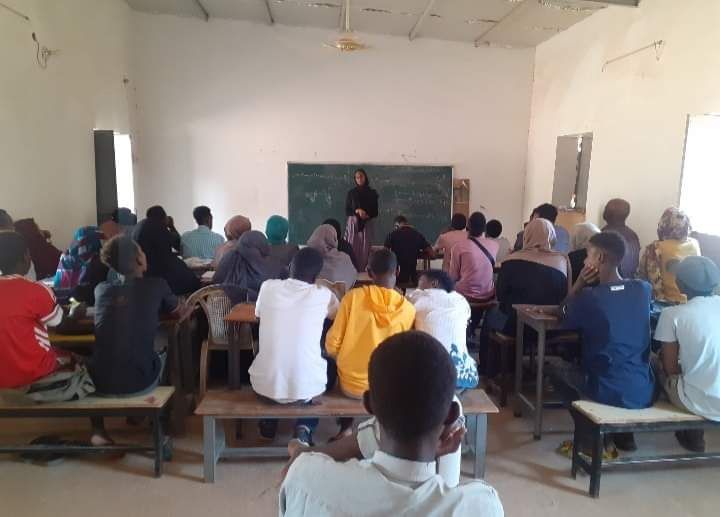
Al Shaab Al Moalem Center (1) Khartoum, Burri Source: Al Shaab Al Moalem Facebook page
Education Without Borders was founded in 2011 by two students from the University of Khartoum through a campaign to collect and recycle schoolbooks under the slogan “Your old book is my new book.” These book collection drives were directed toward areas most in need, becoming the first official project of Education Without Borders, which has since expanded to include eight projects, each targeting specific issues in Sudan’s education system:
1. “Hit and Run” – focuses on improving the school environment.
2. Al Jeref reformatory – academic sponsorship for juvenile detainees.
3. Maktatbna (Our Library) – a free lending library.
4. Reading Club – aims to encourage reading.
5. Book Cinema.
6. Cool School – extracurricular activities.
7. "Al Shaab Al Moalem" Project – literacy and adult education.
8. Textbook Collection Campaign.
In addition, the movement held an annual event for World Book Day on April 23 to encourage reading, commemorates writers, and spotlight their contributions.
Andariya: How many centers of Al Shaab Al Moalem project are there?
Sara: The number of centers officially authorized by the Ministry of Education under the Al Shaab Al Moalem project initially stood at around 17 across various regions of Sudan. After the war began, the total increased to 22 literacy and adult education centers operating across 9 states: Khartoum, North Darfur, South Darfur, River Nile, South Kordofan, Red Sea, Al-Gezira, Blue Nile, and Northern State. However, some of these centers have since suspended operations due to the war, ongoing security challenges, and their aftermath.
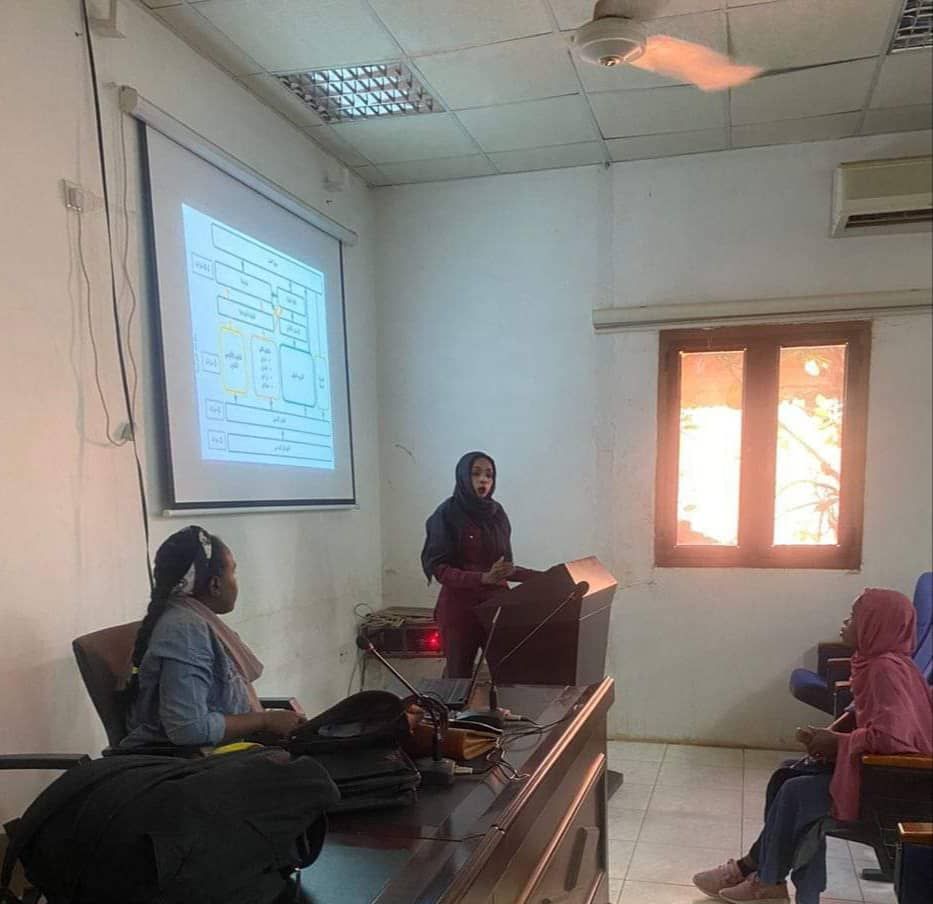
From a workshop to prepare facilitators for teaching literacy and adult education curricula in the Mayo area at the University of Khartoum Development Building. Source: Sara Yassin
Andariya: How did you get involved and become part of the literacy movement in Al Shaab Al Moalem centers?
Sara: I started volunteering with the social change movement Education Without Borders in late 2015 through a post on Facebook about Al Jeref reformatory project. That gave me the opportunity to discover life in a new way and to see the beauty of the diversity in Sudanese communities.
The illiteracy, which was rampant among children and adolescents at Al Jeref reformatory, always caught my attention and left me in awe, how access to education and public services in my country, Sudan, is merely a matter of luck? From that point on, the issue of illiteracy became my main concern and top priority.
I was introduced to literacy and adult education curricula extensively there. I also owe a lot to my esteemed teacher, Mr. Al-Amin Abu Keis, the Director of Training at the National Council for Literacy and Adult Education. He believed in what we were doing and was a role model and guiding light for me all along, and still is. That’s why the Al Shaab Al Moalem project was always a dream of mine and a place I longed to belong to.
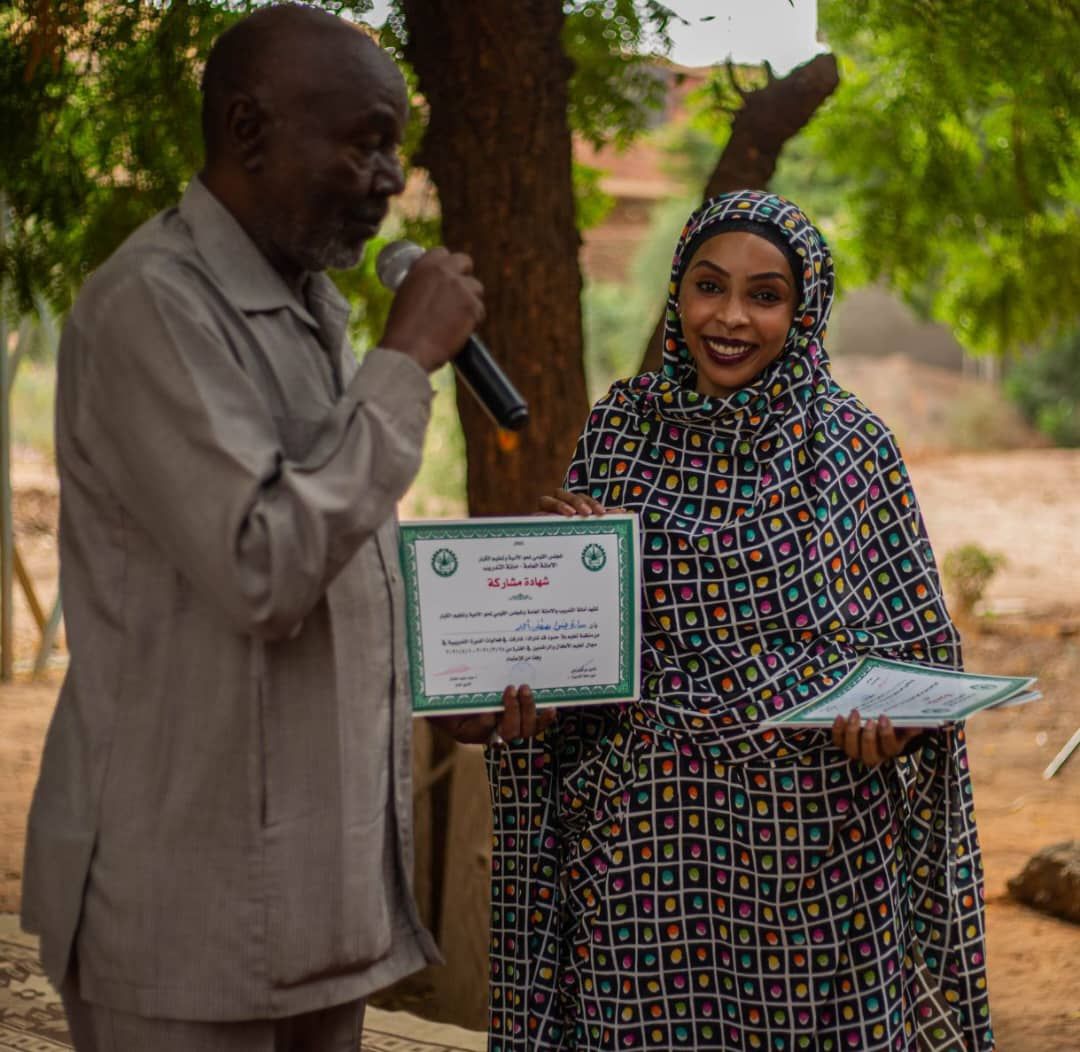
Sara alongside Professor Al-Amin Abu Keis, former Director of the Training Department at the National Council for Literacy and Adult Education. Source: Sara Yassin
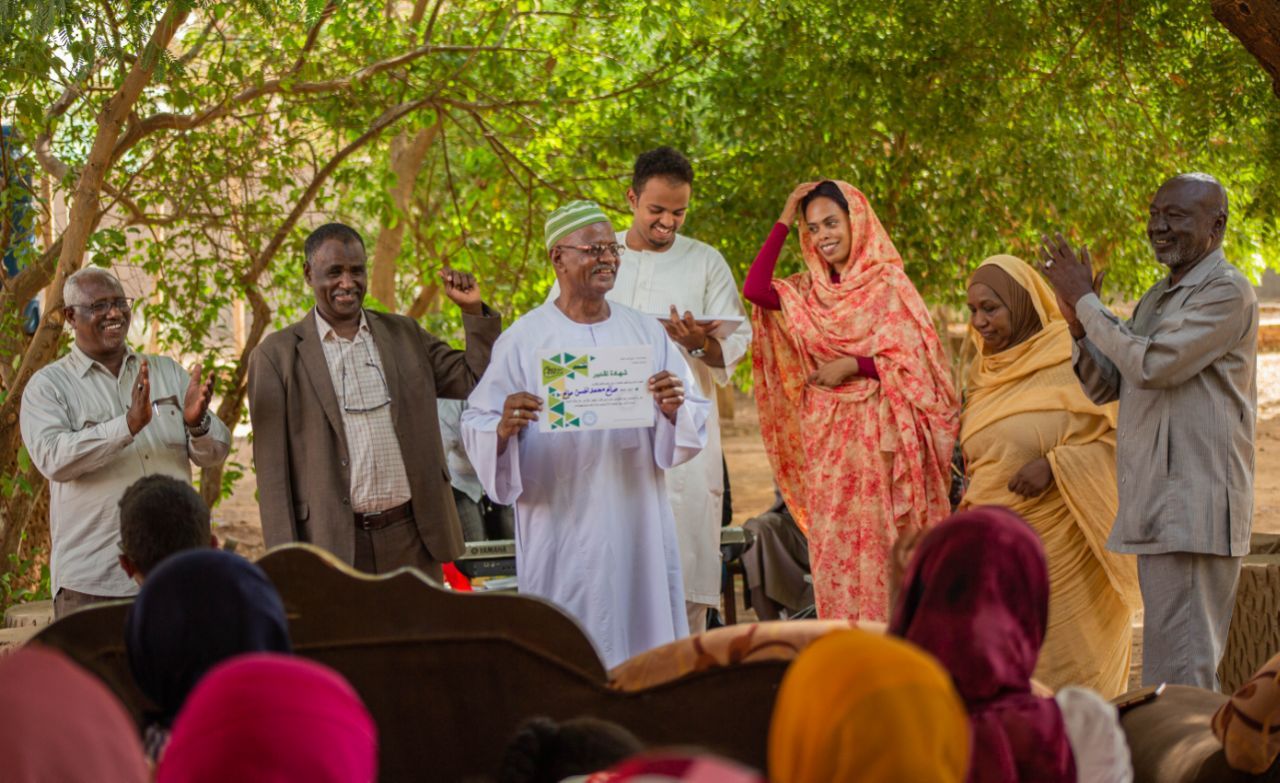
A photo of Uncle Saleh Banga, who achieved the highest score, 217 marks, in the 2021–2022 Sudanese Basic Education Certificate Examination at the sector level in Khartoum, and ranked first at the Al Shaab Al Moalem Center (1). He was honored by the Ministry of Education.
Andariya: How did you continue your efforts in the city you were displaced to? And was the experience different from Al Shaab Al Moalem Center in Burri, Khartoum?
Sara: The ongoing war is one of the worst events Sudan has gone through. In my view, it is primarily the result of long-term, systematic ignorance. Personally, I believe the war wasn’t a coincidence, it was a predictable outcome, only a matter of time.
Mercy and forgiveness to all the martyrs, and prayers for the speedy recovery of the wounded and injured, for the missing, and may God comfort all those affected by the horrors of war.
Despite the severe damage Sudan has endured, the war clearly exposed the deep-rooted problems in the country, such as the centralization of services in the capital, the neglect of development in the states, and the concentration of expertise in Khartoum. Yet, amidst this devastation, the war has also revealed new hopes and many solutions carried by the people of Sudan. We hope the flames of this war are extinguished soon so we can work towards building a Sudan that reflects the love we have for it.
Most volunteers who were displaced to different regions of Sudan found great value in this experience, something we had always dreamed of. Each volunteer carries within them that very seed, ready to plant it wherever God causes it to grow, and so it was. That is what happened. I was very fortunate to be one of those volunteers fighting the war with education.
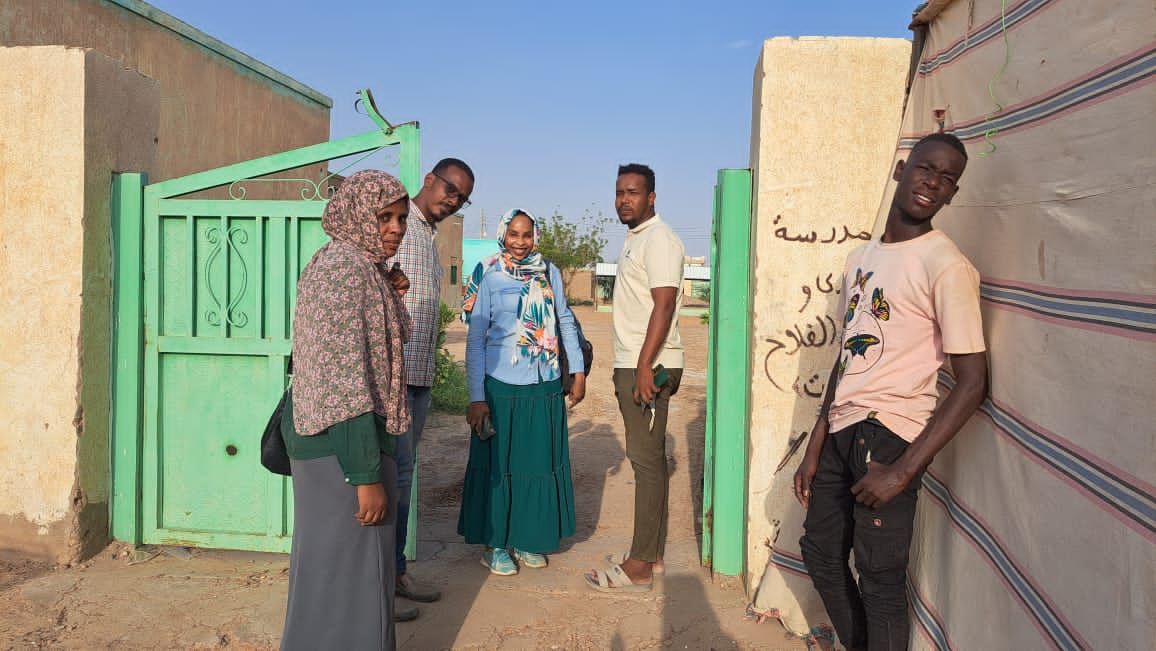
Celebrating the transition of the oldest student, Uncle Abdul Hamid, who sat for the Sudanese Certificate of Secondary Education (SSC) exam for sixth grade, to middle school. Source: Sara Yassin
The project began operating a few months after the outbreak of the war in River Nile State, specifically in the cities of Shendi and Atbara. The first literacy and adult education center was opened during the war, Al Shaab Al Moalem (5) Government Center for Adult and Parallel Education in the Al-Mourada neighborhood of Atbara. This was followed by the opening of three more literacy and adult education centers in Shendi locality. The establishment of these centers soon expanded across Sudan in various states, thanks to the tremendous efforts of the daughters and sons of River Nile State.
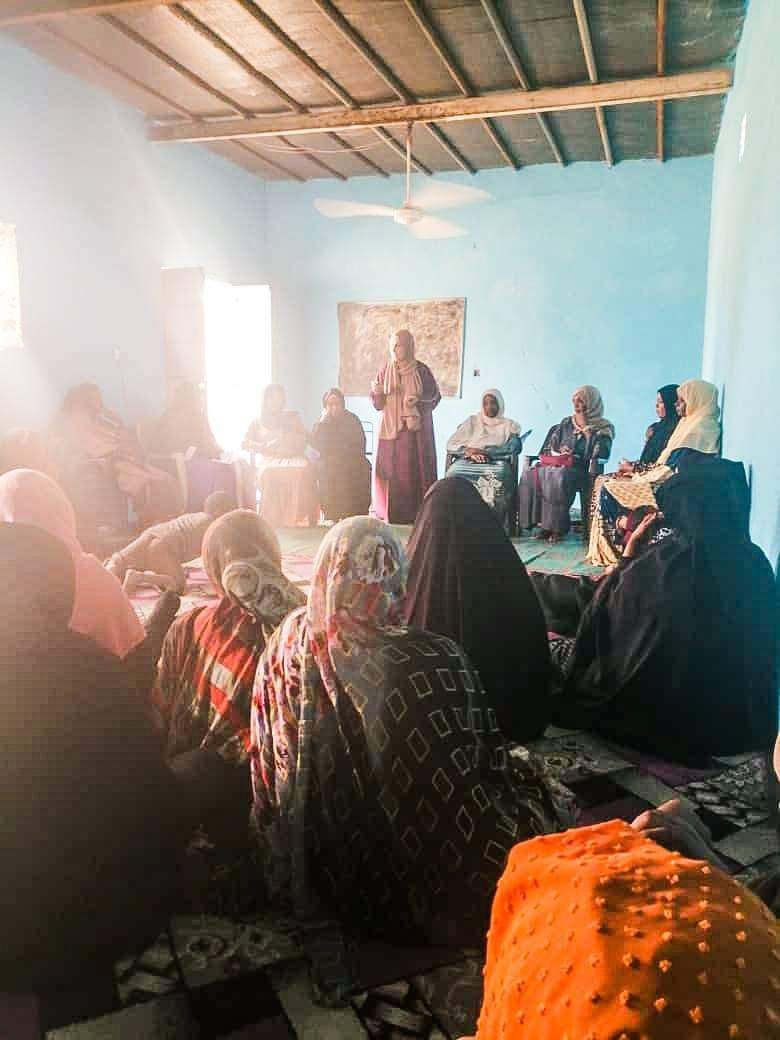
Al Shaab Al Moalem - Shendi
Sara added: "Sudan is unique and distinguished as a beautifully diverse country, from its south, which has only been politically separated from us, to the north, west, and east. Our differences in dialects, and sometimes even languages, in music, melodies, and songs, in clothing, customs and traditions, and in facial features, all form a beautiful tapestry. The more you contemplate each corner of this country, the more you wish never to leave it. That is why every community and region has its own distinctiveness, needs, and specific requirements when establishing a project. As a friend once quoted: "Communities cannot develop apart from their culture."
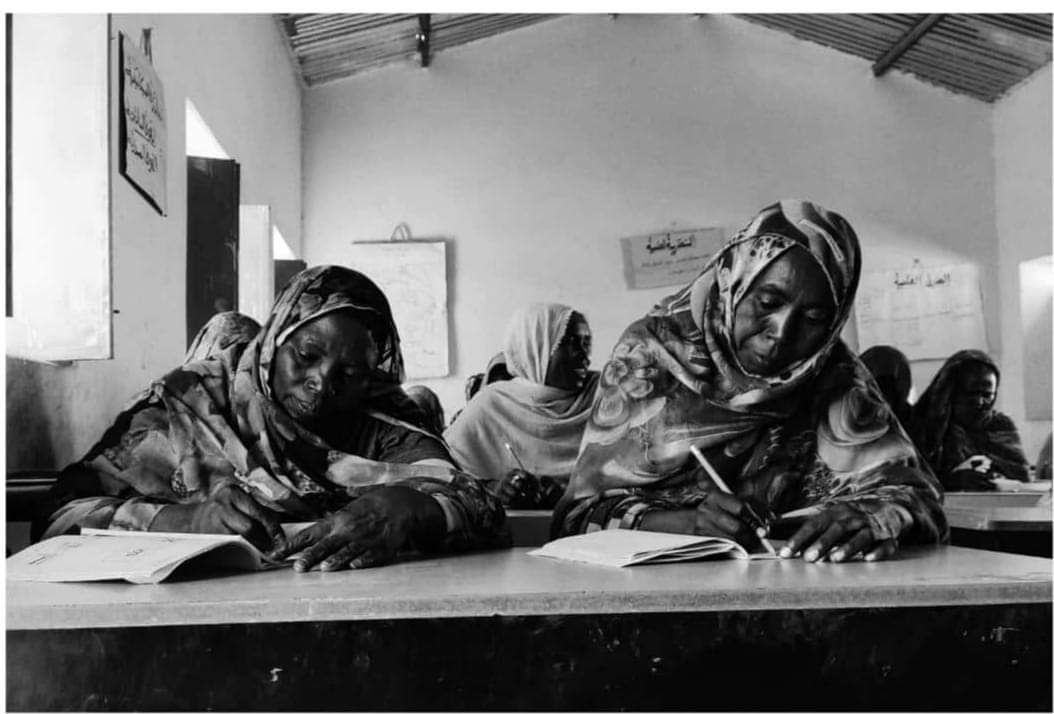
Al Shaab Al Moalem (6) Government Center for Literacy and Adult Education – Dar Al-Rahman, Al-Fashir
Andariya: Why do you still believe in this, and what is the importance and impact of what you're doing?
Sara: I have a personal experience that plays a huge role in my motivation to work on the issue of literacy and adult education. I had to drop out of medical school for several years. During that time, I experienced a mix of emotions, and it opened the door to many questions:
Who am I? What if I don’t finish my studies — does that make me a failure?
Am I of any worth? What is the purpose of my existence?
I felt inadequate, lacked self-confidence, and believed I had failed. I genuinely thought my worth was tied to completing my education, a completely flawed way of understanding oneself. I often describe that period as being at rock bottom. One of the things that pulled me out of that low point was volunteering, especially in the field of education. I have just completed my degree in Dental Medicine and Surgery and am now working toward a bachelor's degree in Business Administration.
So, I am deeply indebted to volunteer work, and especially to my experience with "Education Without Borders." It was through this that I was finally able to answer all those questions above. I now fully understand what someone who has been denied education, or forced to leave it, might go through. This has given me an even stronger drive to help anyone facing the same circumstances I once did.
In addition to that, I love Sudan, and I believe education is the solution to all its problems. I have a friend who always says: “You are not defeated as long as you resist.” And this is my form of resistance.
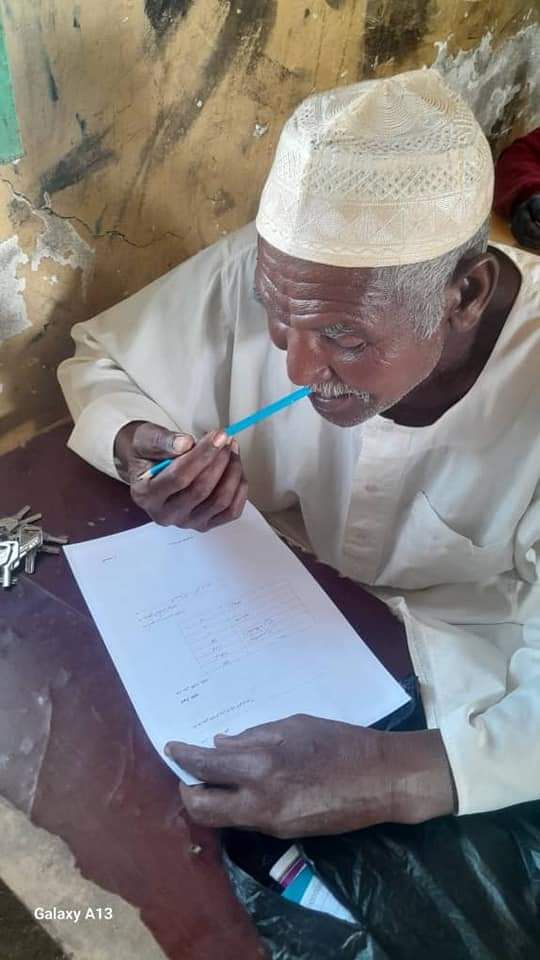
Al Shaab Al Moalem Center (9) - Ad-Damazin
Andariya: What efforts are you currently undertaking, and how has the war affected them?
Sara: Right now, under the slogan "Take the initiative to establish a literacy and adult education center in your area," 12 literacy and adult education centers have been opened out of a total of 17. Some of them had to stop operating due to the war, and others are still under construction. We hope that this idea will eventually spread across all parts of Sudan. The war has had a major impact on volunteer work in general. Volunteers are working under extremely difficult security, economic, and psychological conditions, but their belief in the cause has been even greater.
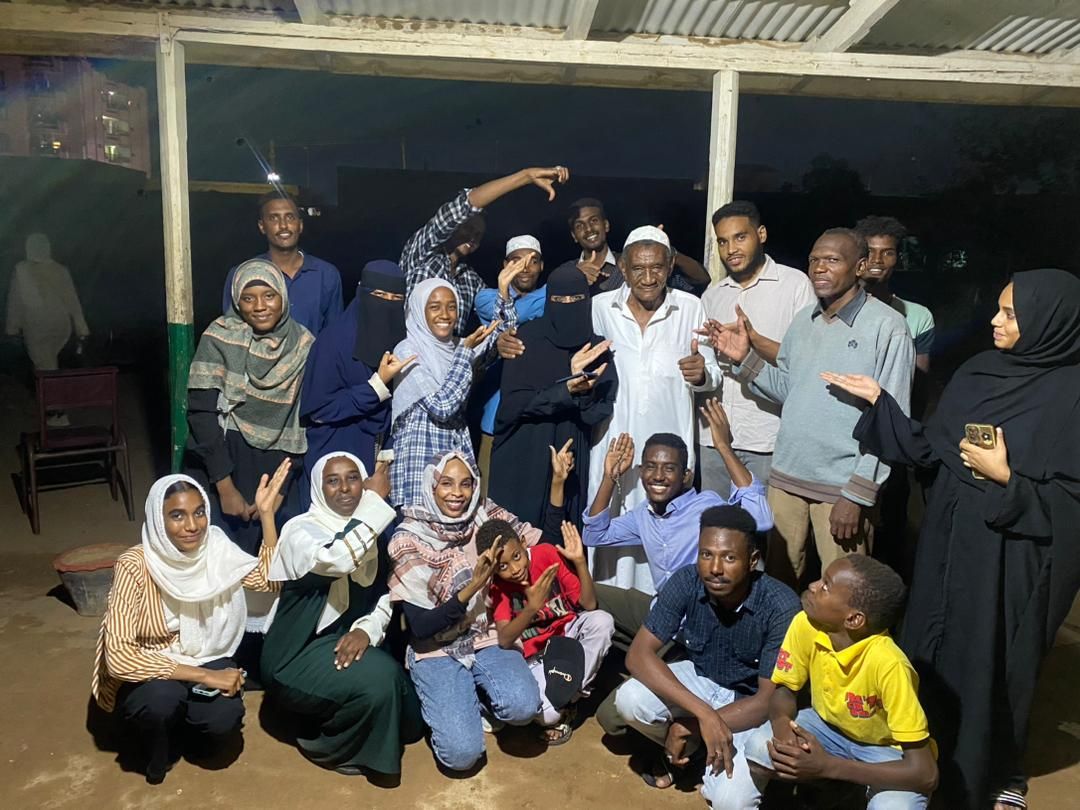
Celebrating the advancement of the oldest learner, Uncle Abdel Hamid, who sat for the Sudanese sixth-grade elementary certificate exam, as he moves on to the intermediate level. Source: Sara Yassin
Andariya: What are your visions for education after the war?
Sara: In our beautiful new Sudan, that is soon to come, I hope that primary education will be prioritized, with education made free of charge, and clear and strict laws enforced to make primary education compulsory for all children. I also hope for a good allocation of the national budget to the education sector, to improve the school environment, refine the curriculum in ways that reflect our diversity and multiple cultures, and keep up with global developments. We need to ensure the availability of schoolbooks and provide training for teachers, so they can help raise healthy, well-rounded generations capable of leading Sudan to the forefront among nations. I am full of hope that we will one day have a Sudan free from illiteracy and fully healed.
Conclusion
Sara saw the impact of education in every learner, in their personal, professional, and social lives. She witnessed those who, once they learned to read and write, regained their self-confidence: someone who was able to marry his beloved after obtaining his basic education certificate; someone who entered university, graduated, and got a job at the same university, enabling him to support his family; someone whose dream was simply to read the Qur’an and finally achieved it; and someone who went on to inspire others.
One of the most powerful stories that deeply moved Sara was of a student in third year of secondary school, attending Al Shaab Al Moalem (1) Center, who embraced the idea of the “Al Shaab Al Moalem” project and went on to establish four literacy and adult education centers in his region, serving nearly 300 beneficiaries.
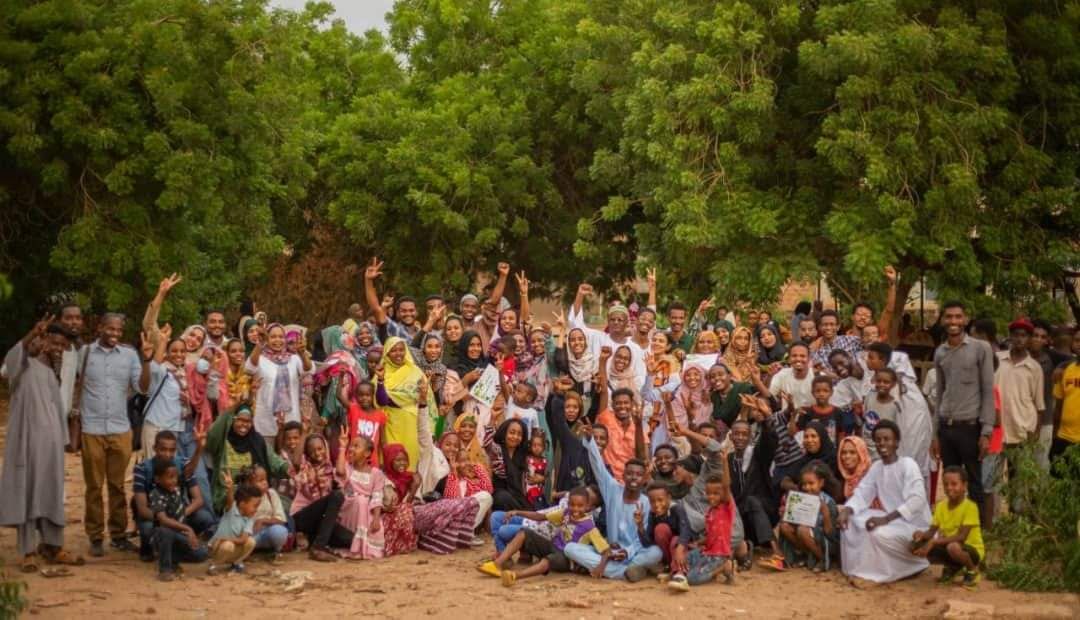
Shaab Al-Muallim Center (1), Khartoum – Burri: Celebration of the success of the first cohort of students at the center after passing the Sudanese Basic Education Certificate Examination for the academic year 2021–2022.
Quality education is the fourth goal of the Sustainable Development Goals (SDGs). Yet Sudan continues to suffer from the effects of illiteracy and delays in addressing it, leaving behind a fragile society burdened with violence, ignorance, unemployment, racism, and countless other problems - all while a conflict rages on, exacerbating the crisis.
